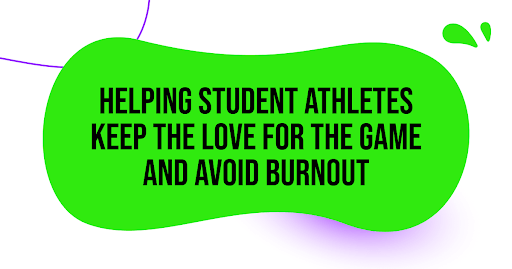
Playing sports can be a rewarding experience for student-athletes. It provides opportunities for physical activity, social interaction, and personal growth. However, the pressures and demands of competitive sports can sometimes lead to burnout, causing student-athletes to lose their passion for the game. As coaches, parents, and mentors, it’s crucial to support student-athletes in maintaining their love for the game and avoiding burnout.
Here’s what can help to avoid burnout:
- Emphasize Fun and Enjoyment
The main reason why most student-athletes start playing sports is that they love it. However, as they progress in their athletic journey, the focus can shift to winning, performance, and external expectations. Coaches and parents should emphasize the importance of having fun and enjoying the process of playing the game, regardless of the outcome. Encourage student-athletes to find joy in the sport by focusing on the aspects they enjoy the most.
- Promote Balance and Rest
Burnout can occur when student-athletes are overloaded with sports-related activities, leaving little time for rest and recovery. Coaches and parents should encourage a healthy balance between sports and other aspects of a student athlete’s life, such as academics, hobbies, and social activities. It’s important to recognize that rest and recovery are crucial for physical and mental well-being, and they can actually enhance performance in the long run. Encourage student-athletes to take breaks, get enough sleep, and listen to their bodies to prevent burnout.
- Foster a Supportive and Positive Environment
The environment in which student-athletes play a sport can significantly impact their passion for the game. Coaches, parents, and teammates should work together to create a supportive and positive environment that nurtures the love for the game. This includes promoting sportsmanship, celebrating individual and team achievements, and providing constructive feedback. Encourage student-athletes to express their thoughts and concerns openly, and actively address any issues or challenges they may face in a supportive manner.
- Set Realistic Expectations
Student-athletes may face immense pressure to perform at a high level consistently. Unrealistic expectations can lead to anxiety, stress, and ultimately burnout. Coaches and parents should work together to set realistic expectations for student-athletes, taking into consideration their age, skill level, and personal goals. Encourage them to focus on their own progress and improvement rather than constantly comparing themselves to others. Help them understand that setbacks and failures are a part of the learning process and should not deter their passion for the game.
- Support Mental Health
The pressure and demands of competitive sports can take a toll on a student athlete’s mental health. It’s important to prioritize mental health and well-being alongside physical performance. Coaches and parents should educate student-athletes about the importance of mental health and provide resources and support if needed. Encourage them to develop healthy coping mechanisms, such as mindfulness, meditation, and talking to a mental health professional, to manage stress and prevent burnout.
Helping student-athletes maintain their love for the game and avoid burnout requires a holistic approach that focuses on their physical, mental, and emotional well-being.



